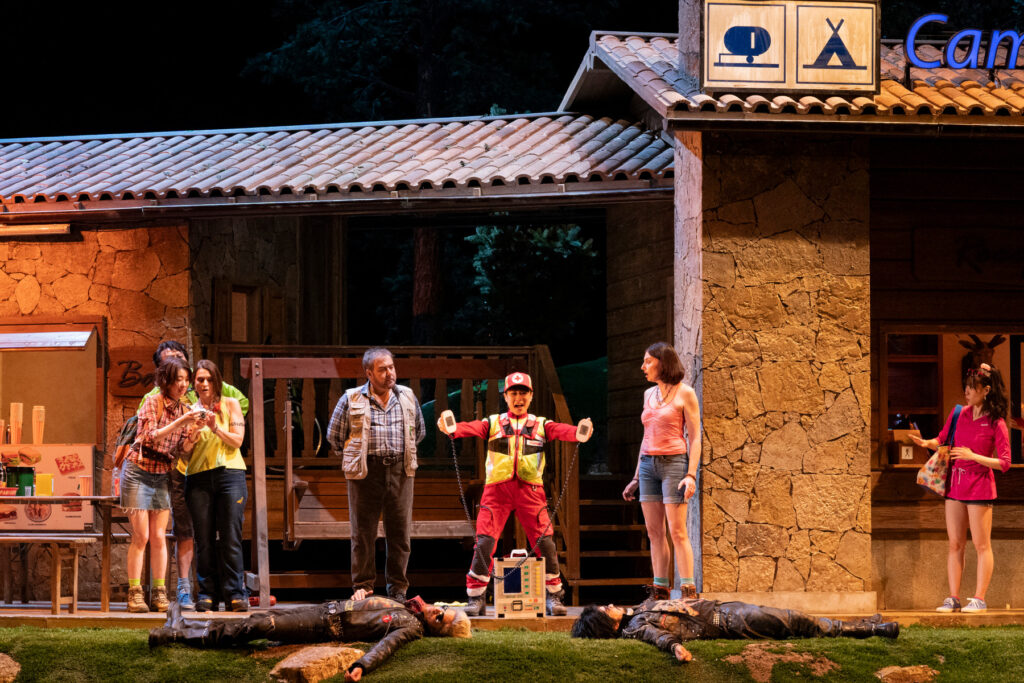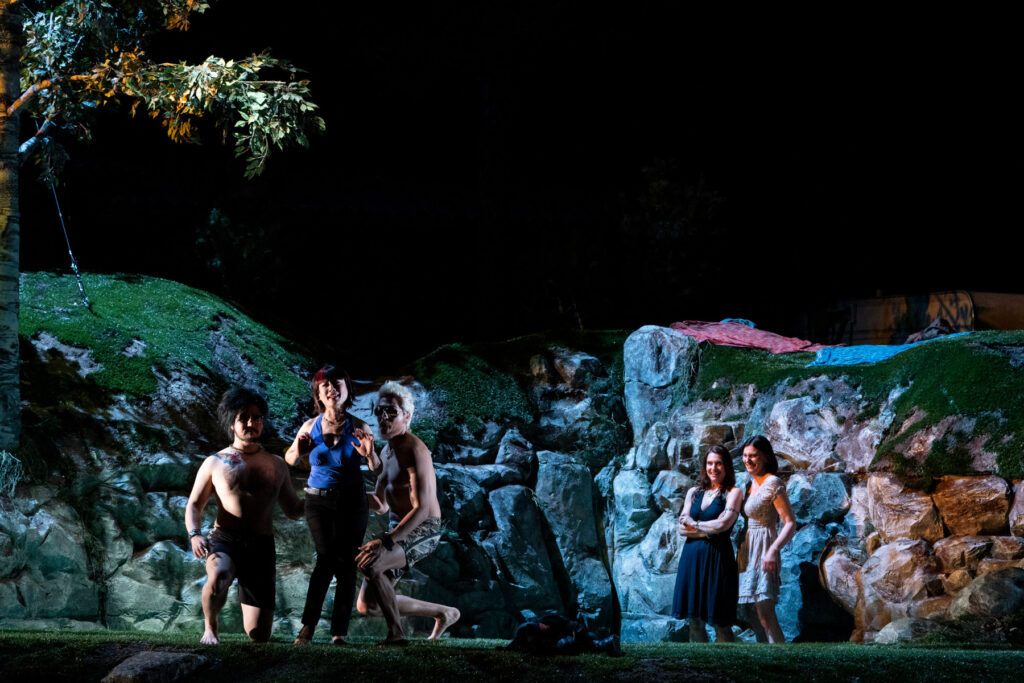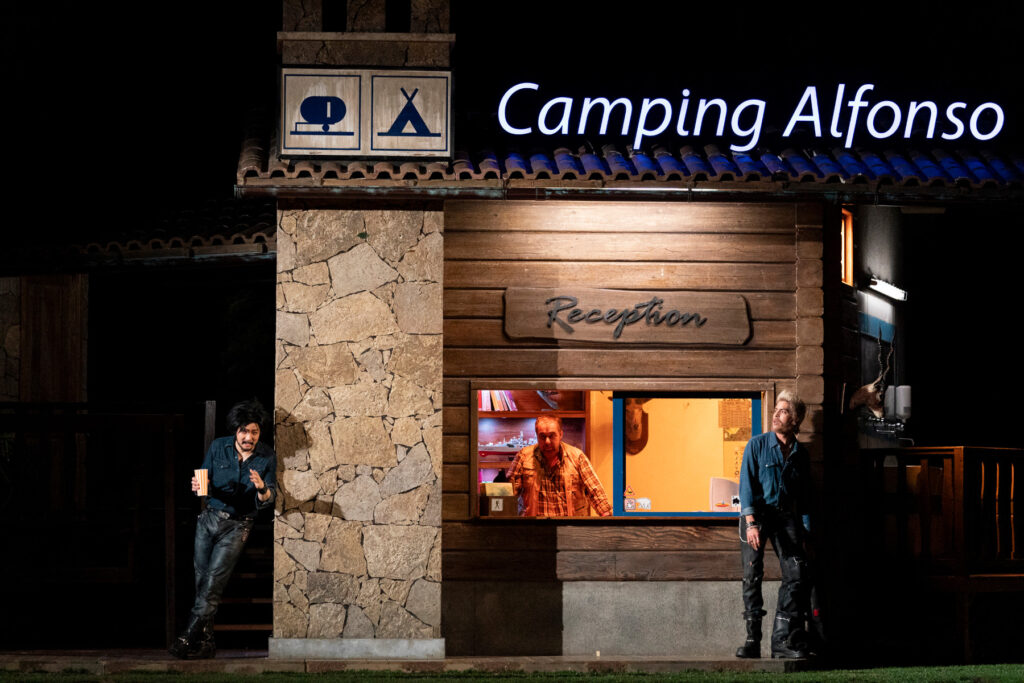Damiano Michieletto’s 2011 production of Mozart’s Così fan tutte, making a welcome return to the New National Theatre, Tokyo, was seen on June 1. Set in a contemporary campground, vividly designed by Paolo Fantin, Michieletto’s focus on “what happens within a person when they are loved and pursued” (Production Note) was explored in detail. In this production, Don Alfonso, the cynical philosopher in Mozart/Da Ponte’s third comic opera, is the owner of “Camping Alfonso” and living as a recluse surrounded by nature. He and Despina, a barmaid at his campsite, portrayed as essentially unhappy individuals afraid of really loving another person, are gradually drawn to each other alongside the romantic entanglements of the four young lovers. The casting was generally convincing in this revival, directed by Yasuhiro Miura, and there was clearly a good rapport among the six soloists.

As the delicate yet steadfast Fiordiligi, Serena Gamberoni gave a well-defined portrait with her elegant, limpid voice and matching ingénue expressions. Her bravura aria “Come scoglio” was courageously sung on top of her caravan, and her poignant “Per pietà,” sung alone in the dark forest, was undoubtedly the afternoon’s emotional high-water mark: an impressive house debut.
Daniela Pini’s Dorabella, the role she created here in 2011, was alluring and seductive. With her sinuous, sultry, Carmen-like demeanour and her dark, velvety voice, she enamoured the audience as well as the disguised Guglielmo. Her sonorous voice blended well with the other voices yet was clearly discerned in every ensemble. Her first aria “Smanie implacabili” was curiously sung adagio, despite being marked as Allegro agitato in the score, and the “out-of-breath” quality vital to this aria was lost. The sisters’ charming duets, “Ah, guarda, sorella” in Act 1 (while turning pages of Vanity Fair magazine) and “Prenderò quel brunettino” in Act 2 (while dipping their toes in the pond à la Fontana di Trevi in La Dolce Vita), were both pitch-perfect and simply beautiful.

As the upright Ferrando, Spanish-born tenor Joel Prieto stole almost every scene with his tall, well-proportioned, naturally elegant figure. His transformation from a shy, awkward Ivy-league college student (as it seemed) into a brittle-haired punk “biker” was executed so skilfully that it was hard to believe the two characters were really acted by the same person. His heart-warming aria “Un’aura amorosa” was sung with a quintessentially Mozartian lyricism: a brilliant house debut. His worldly pal Guglielmo was convincingly portrayed by the Japanese baritone Takaoki Onishi (replacing Mattia Olivieri) with plenty of amusing gestures. Both his arias were sung in a powerful, ringing voice with flowery cadenzas.
Painfully faithful (perhaps) to the direction, Don Alfonso, played by Filippo Morace, emerged as a dried-up old man, totally lacking the philosophical touch. One had to suspect that his feeble voice, hardly reaching the audience, was intended. This Alfonso looked and sounded more like a mumbling prompter until almost the end, when he enunciated “Così fan tutte” (all women are like that) most dramatically. His “better half” Despina was coquettishly portrayed by the Japanese soprano Kanae Kushima. Her two irresistible arias were sung masterfully in a light, slightly metallic voice. Her anime-like actions in her matching costumes for her doctor and notary impressions amused the audience.

At the end there was a surprising outbreak of booing when the conductor, Norichika Iimori, appeared on the stage. The last time this reviewer experienced any kind of booing at the NNTT was back in May 2018, when Katharina Wagner’s controversial new production of Beethoven’s Fidelio upset, with some reason, the audience. In this case, it was much harder to determine what was being objected to. The performance of the Tokyo Philharmonic Orchestra was generally excellent. The strings and harpsichord were splendid, though the wind section could have done with a little more sophistication. The singing from the chorus was superb as always. Perhaps the objection was to the altered tempo of “Smanie implacabili.” Altogether, though, this was a highly entertaining performance with brilliant ensembles.
Natsuko Hirakura
Così fan tutte (K. 588)
Composed by Wolfgang Amadeus Mozart
Libretto by Lorenzo Da Ponte
Cast and production staff:
Fiordiligi – Serena Gamberoni, Dorabella – Daniela Pini, Despina – Kanae Kushima, Ferrando – Joel Prieto, Guglielmo – Takaoki Onishi, Don Alfonso – Filippo Morace
Conductor – Norichika Iimori, Production – Damiano Michieletto, Set and Costume Design – Paolo Fantin, Lighting Design – Alessandro Carletti, Revival Director – Yasuhiro Miura, Stage Director – Kensuke Murata
New National Theatre Chorus, Tokyo Philharmonic Orchestra
New National Theatre Tokyo, Saturday the 1st June 2024
All photographs © Rikimaru Hotta